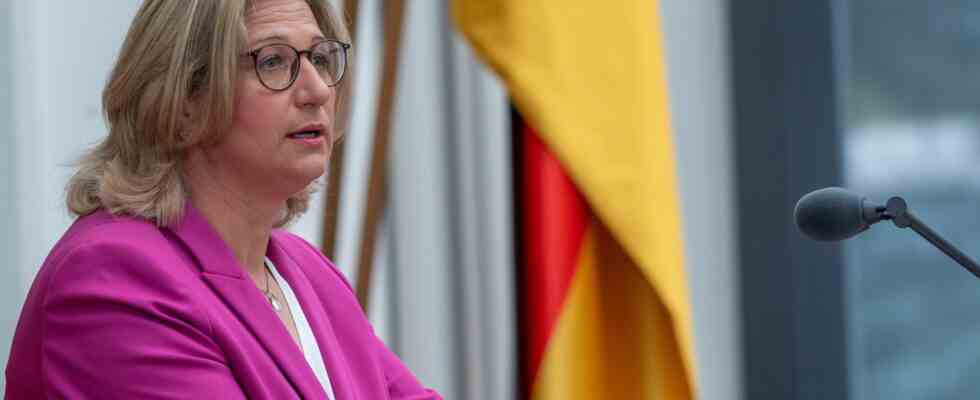analysis
Status: 04/26/2022 2:38 p.m
The only single government in Germany is now in office in Saarland. SPD Prime Minister Rehlinger is quite self-confident. But the challenges could hardly be greater.
It’s not easy to interpret the expression on Anke Rehlinger’s face when the election result is announced: 32 yes votes, 19 nos. This makes her Prime Minister of the only sole government in Germany. She even got three more votes than her SPD has mandates, to the great surprise of all people from the AfD.
Her expression betrays relief, joy, and almost a little exhaustion at the same time. The night before her election was short, like many in recent campaigning and government-forming months. But respect for the future task is also written all over the face of the newly elected Prime Minister.
Rehlinger facing great challenges
With her government, she now bears sole responsibility for political decisions in a country that is facing one of the greatest challenges in its history. A country that has to master a gigantic structural change, which is characterized by the steel and automotive industries, in which thousands of jobs are at risk, without it being clear in which sectors enough new ones should be created. A country whose steel industry is particularly energy-intensive, but which is lagging behind in the expansion of renewable energies.
A country whose population is not only getting older, but also getting smaller and smaller. And that sits on a huge mountain of debt, in which every euro has to be turned over three times. “What we are facing is broader and deeper than the crises in individual sectors before,” said Rehlinger in her first government statement as Prime Minister.
The financial crisis in particular will not make it easy for her and her team. Not all promises made in the election program will be implemented. The SPD must now prioritize its own projects and explain why some things fall behind. The argument that a project cannot be implemented with the coalition partner no longer counts.
SPD reminds the federal government of promises to help old debts
But the election result of 43.5 percent also gave Rehlinger weight nationwide. And now she wants to use it to solve the debt problem. Every available euro from Berlin and Brussels must be collected, she says. To this end, she has brought the former chief economist in the Federal Ministry of Finance and Member of the European Parliament, Jakob von Weizsäcker, into the cabinet as finance minister.
As soon as he took office, Rehlinger made it clear to Berlin and Brussels that there was no longer any basis for giving preference to the East when allocating subsidies. And the debt brake and the federal-state financial equalization in the current form are not set in stone. There is someone speaking who knows: you can’t just ignore her with this election result. And yet: In the federal government, the willingness to assume debt should not have increased in view of the billions spent on Corona, climate protection and armament.
The previous economics minister, Rehlinger, wants to make the issue of jobs a top-level issue and, unlike her predecessor Tobias Hans, want it to be in the state chancellery. Their goal is 400,000 jobs subject to social security contributions. That’s only a few thousand more than now. In view of forecasts that 50,000 jobs could be lost in Saarland by 2035, the scale of the project becomes clear.
Above all, Rehlinger will have to be measured against the country’s economic development. And she can only influence them to a limited extent. Politicians can offer good framework conditions to large corporations, such as Ford, an important employer in Saarland, but not much more.
Education as a target for the opposition
Rehlinger wants to invest in education: more all-day offers, the reintroduction of the nine-year high school, abolition of daycare fees. Especially in the field of education, the SPD’s heartfelt concerns could often not be implemented in the grand coalition. And it is at this point in particular that the CDU and AfD, as the only opposition parties, could start in the future.
While the CDU, now the opposition leader in the state parliament, was still holding back critical words on the day of the prime ministerial election, that changed radically a day later. Group leader Alexander Funk accuses the new incumbent of a lack of concept and ideas. Instead of concrete plans, your speech contained nothing but phrases, he criticized.
A start in terms of opposition work, in which the CDU has to find its way into the government after almost 23 years. The Union is still in the process of coming to terms with the devastating election defeat and also reorganizing itself in terms of personnel. Who will be the new party and parliamentary group leader will be decided at the end of May.
Hans is just a simple member of parliament
One scene impressively shows that Tobias Hans is unlikely to play a role in this reorientation: When the plenary session is over, the new CDU parliamentary group poses for a group picture. The photographer notes that the number is not complete yet. Tobias Hans is missing. “Just get started,” someone in the group calls out.
The CDU has announced constructive cooperation in parliament. But in order to be successful again, it must clearly differentiate itself from the SPD’s sole government. In any case, the SPD cannot hope for old solidarity from ten years of the grand coalition.
Rehlinger bears sole responsibility. This morning, chimney sweeps came before the state parliament to wish the newly elected head of government good luck in the old tradition. Rehlinger greets them in a particularly friendly manner. She will need luck.

